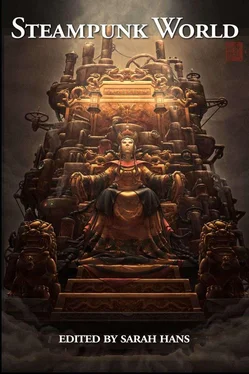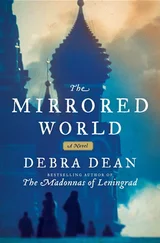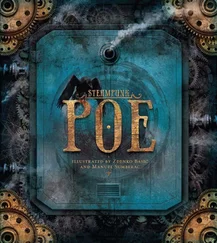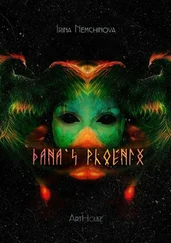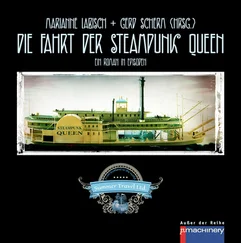“Papers,” he echoed, but the word sounded like an afterthought. Nina stiffened and licked her lips. Color suffused her cheeks.
“I’m terribly sorry, sir, but we seem to have forgotten our papers,” she said.
The older soldier spluttered, phlegm dripping from under his nose-whiskers, his hand twitching around the barrel of his revolver. “Roll up your sleeves,” he wheezed.
Elena grabbed Nina’s hand, wondered how far and fast they could run before the bullets caught them, reminded herself that she wasn’t scared.
“Gleb,” the younger soldier said, still staring at Nina. “These are girls from the city. They live just on the other side of the church. I recognize them.”
“They’re those nobles,” Gleb said. “I can tell. Look at the kid gloves. Nobles, stealing from the people—”
“I’ll take them home,” the younger soldier said. He looped one gloved hand under Elena’s elbow and one under Nina’s. Elena hated him touching her, but what other choice did she have? She forced herself to stay still.
“They scream when you rip their wings and tails off.” Gleb licked the mucus off his upper lip. “And—”
“Stop.”
Gleb ground his boot against the snow, grumbling.
“That’s an order,” the younger soldier snarled. He led Elena and Nina through the gate, marching towards the church.
“Where are you taking us?” Elena said. “Why are you helping?”
“Go out the west entrance of the city,” the soldier said. “Ivan’s on the gate, but he’ll be too drunk to question you. He’s always drunk since his wife starved during the famine last winter and left him alone with the children. And don’t come back to the city. Get out of here, fast as you can.”
“Why are you helping us?” Elena demanded, but she already knew the answer. The soldier was staring at Nina again, who demurely brushed blown snow off her cheek.
He led them towards the west gate of the city. They dodged around a line of kerchiefed women clutching baskets or children’s hands outside a crumbling storefront.
Elena cast her eyes over the line, searching for the man she had beaten with the opera glasses, or for one of the many peasants who had once worked on their family’s estate and had risen up against them.
A woman stood in the line, about Elena’s age, her green eyes sharp under her bedraggled fur hat. A threadbare brown dress peeked out from under her coat-hem, the dress of a peasant. Her bare fingers, which clenched around the handles of an empty basket, were just as red and chapped as Elena’s, just as callused from chopping firewood and scrounging for food.
The woman’s cheeks were hollow, the same hollowness that had sagged Nina’s and Elena’s cheeks these past months.
This woman didn’t murder my parents.
She shook off the thought. She couldn’t start showing mercy. Father had shown mercy, the night of the fire, had tried to reason with the mob instead of shooting at it.
She hurried after Nina and the soldier.
A few steps from the west gate, the soldier seized Nina’s hand and pressed his lips against the protruding veins there.
“Let’s go.” Elena grabbed Nina’s other hand, dragged her towards the gate.
They trudged through knee-deep snow around the shadow of the kremlin, concealing their faces under their fur hats, until they rejoined the southern road through the marshes back towards the boxcar.
“That man.” Elena’s tail creaked erect again, stretching the swollen skin on her lower back. “The way that man looked at you, Nina. I can’t stand it.”
“Aleksandr.”
“Pardon?”
“Oh…he said his name. Aleksandr.” Nina stared at the snow beneath her shoes.
“When did he say that?”
“At some point. You weren’t listening, I suppose.”
“Well, it’s good that Aleksandr was there,” Elena said. “It’s good, because otherwise we wouldn’t have escaped. But my God, only helping us because he wanted to stick—”
“That’s quite enough.” Nina cradled her right hand with her left and tightened her jaw. “I won’t listen to this anymore. Not all of them are bad, you know, he wasn’t bad, he saved our—”
“Am I offending your delicate sensibilities, dearest? If I hadn’t been there, what might he have done to you? We’re lucky. But don’t confuse it with romance. This isn’t a novel.” That man only helped us because he wanted Nina. He’s not like us, and neither is that woman. They’re nothing like us. Nothing.
“In any case, whatever are we supposed to do now?” Nina said. “He said not to return to the city, and we need—”
“I don’t care what he said. We’ll wait a few days. Then I’ll sneak into the city at night. We need oil, and it’s our city besides. I won’t let them stop me.”
Elena rummaged in her carpetbag, pushed aside their grandmother’s diadem, a tangle of shawls, her father’s book of maps of Novgorod. At last her fingers closed on cherrywood, and she pulled it out: the 1895 double action Nagant revolver-cuff. Her chest hurt when she remembered the night news of the Tsar’s abdication had reached them and Father had summoned her to his study.
“You’re the son I never had, Lena,” he had said. Was he joking? She never found out. He had handed her the revolver-cuff, reminded her that she could use it without clamping it to her arm.
“Oh, you’re bringing the gun?” Nina extracted her nose from the Pushkin book. “You’re not going to…that is, you know if you affix it to your arm—”
“Yes, dearest, I’m aware of the history of revolver-cuffs.” Everyone knew that since they were first used in the war against Napoleon, revolver-cuffs had been permanent additions to the body, both to discourage foot-soldiers from deserting and to allow officers to show off their bravery.
She had heard tales of Red Army troops chopping off Tsarist soldiers’ arms and commandeering their gun-cuffs.
“But—”
“I’m not going to put it on.” Even though it would work better if I did. Elena examined the curved black metal clamps that flanked the revolver-cuff, imagined them chomping into her arm, burrowing beneath her skin. “But I’m bringing it with me tonight. Just in case.”
“Elena.” Nina sighed. “Are you positive…”
Elena dropped the revolver-cuff into her coat pocket. “I’ll go in through the west gate. That man who wanted you said the guard on that gate is always drunk.” She shouted over Nina’s cough. “I’ll simply act as though I’m supposed to be there. It’s our city. They can’t keep me out.”
“Have you considered…that is, do you envision…perhaps we should…leave?”
Elena’s stomach swooped. “And where do you think we should go?”
“Anywhere. We could try to leave Russia. We could—”
“We’re not even leaving this city. This is our land. I should’ve known that that man could make one comment and—”
“Some aristocrats leave, and have their accoutrement removed by doctors at the border, and they set up quite happy lives in—”
“Have you gone mad?” Elena’s nerves twitched as she imagined her body without her feathers’ sharp edges scraping against her thighs. “Remove our accoutrement ? Perhaps I should change my name from Elena Sergeevna Trubetskoy. Perhaps I should forget who I am.”
“We wouldn’t have to sneak about, steal oil, subsist on rusk and tea, worry about being…being shot…we could have flowers and a townhouse and go boating…”
Elena imagined it, just for a moment: the life Nina had laid out, far from this place where their house and parents had burned. Would she be able to forget Russia, if they traveled far away and slipped into that idyllic life?
Читать дальше
